University Report: Managing People and Organisation, POLC Analysis
VerifiedAdded on 2020/05/16
|5
|826
|615
Report
AI Summary
This report, titled 'Managing People and Organisation,' analyzes the application of the Planning, Organising, Leadership, and Controlling (POLC) framework in a real-life incident. The student describes a situation where they were responsible for hiring and managing a dishwasher in their family's restaurant. The report details the initial challenges with the employee's performance and the strategies employed to improve efficiency and motivation. The analysis includes setting goals, reorganizing tasks, providing leadership through motivation, and implementing control mechanisms. The student critically evaluates the effectiveness of these strategies, referencing management theories such as goal-setting theory, the Hawthorne effect, and expectancy theory. The report concludes with a discussion of alternative strategies and the overall effectiveness of the POLC framework in problem-solving and employee management, supported by relevant academic references.
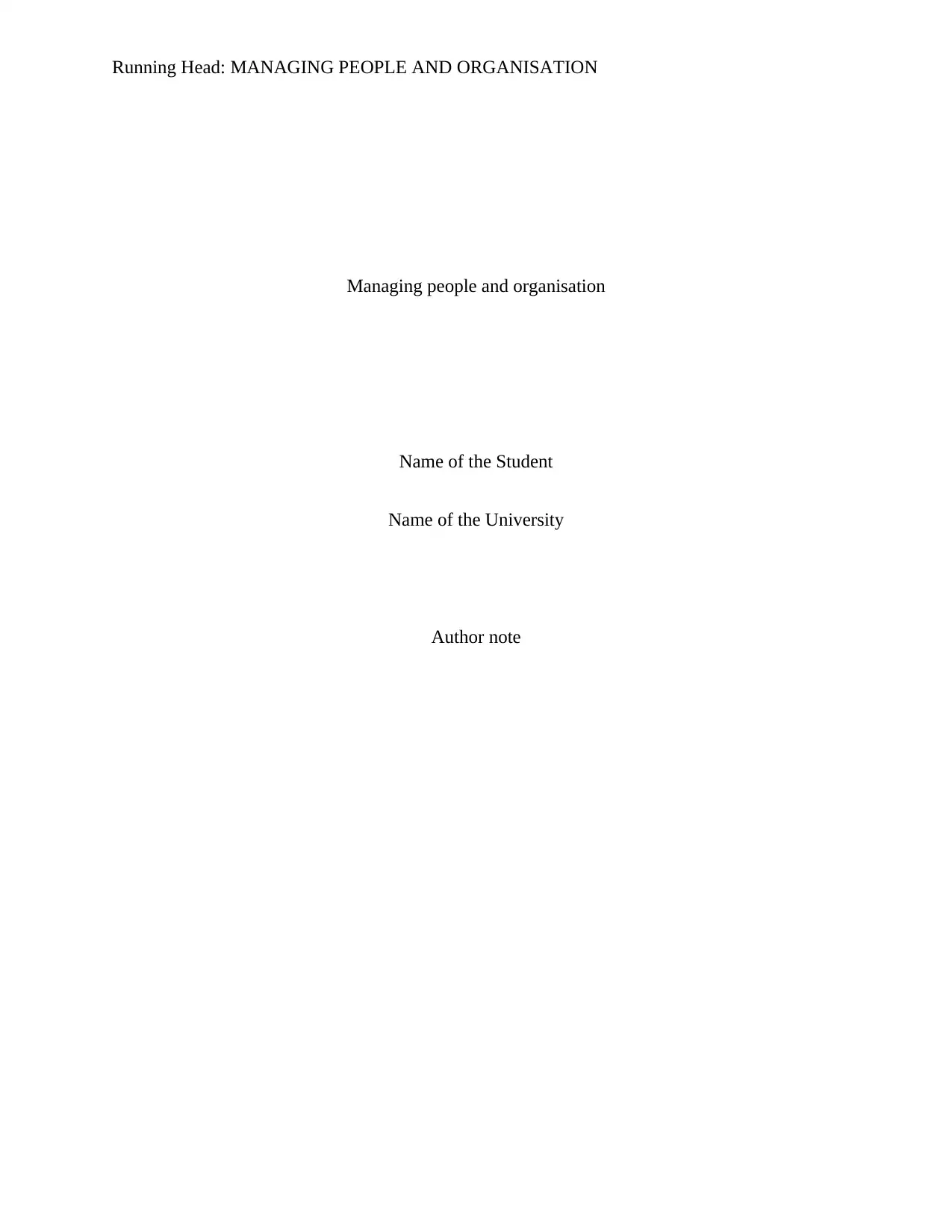
Running Head: MANAGING PEOPLE AND ORGANISATION
Managing people and organisation
Name of the Student
Name of the University
Author note
Managing people and organisation
Name of the Student
Name of the University
Author note
Paraphrase This Document
Need a fresh take? Get an instant paraphrase of this document with our AI Paraphraser
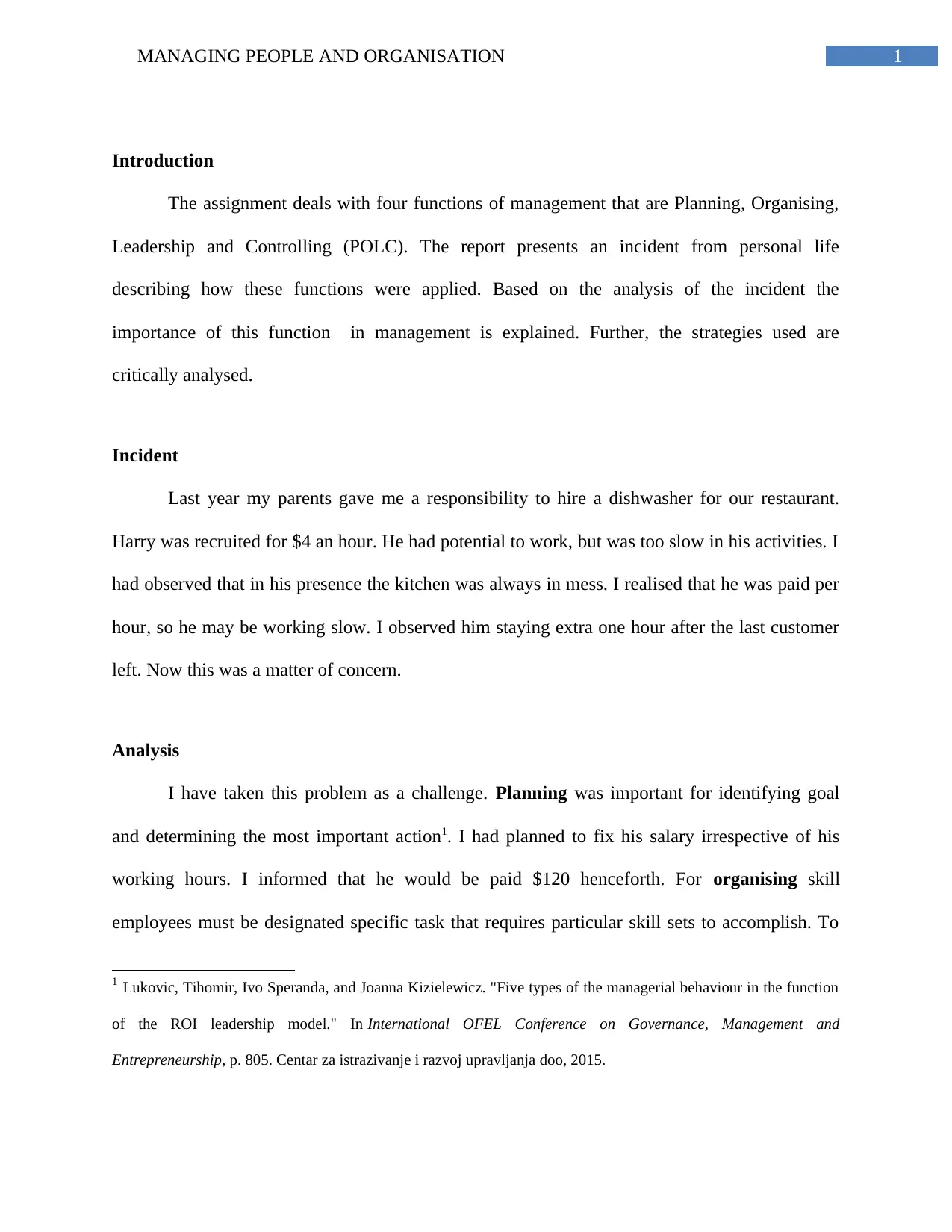
1MANAGING PEOPLE AND ORGANISATION
Introduction
The assignment deals with four functions of management that are Planning, Organising,
Leadership and Controlling (POLC). The report presents an incident from personal life
describing how these functions were applied. Based on the analysis of the incident the
importance of this function in management is explained. Further, the strategies used are
critically analysed.
Incident
Last year my parents gave me a responsibility to hire a dishwasher for our restaurant.
Harry was recruited for $4 an hour. He had potential to work, but was too slow in his activities. I
had observed that in his presence the kitchen was always in mess. I realised that he was paid per
hour, so he may be working slow. I observed him staying extra one hour after the last customer
left. Now this was a matter of concern.
Analysis
I have taken this problem as a challenge. Planning was important for identifying goal
and determining the most important action1. I had planned to fix his salary irrespective of his
working hours. I informed that he would be paid $120 henceforth. For organising skill
employees must be designated specific task that requires particular skill sets to accomplish. To
1 Lukovic, Tihomir, Ivo Speranda, and Joanna Kizielewicz. "Five types of the managerial behaviour in the function
of the ROI leadership model." In International OFEL Conference on Governance, Management and
Entrepreneurship, p. 805. Centar za istrazivanje i razvoj upravljanja doo, 2015.
Introduction
The assignment deals with four functions of management that are Planning, Organising,
Leadership and Controlling (POLC). The report presents an incident from personal life
describing how these functions were applied. Based on the analysis of the incident the
importance of this function in management is explained. Further, the strategies used are
critically analysed.
Incident
Last year my parents gave me a responsibility to hire a dishwasher for our restaurant.
Harry was recruited for $4 an hour. He had potential to work, but was too slow in his activities. I
had observed that in his presence the kitchen was always in mess. I realised that he was paid per
hour, so he may be working slow. I observed him staying extra one hour after the last customer
left. Now this was a matter of concern.
Analysis
I have taken this problem as a challenge. Planning was important for identifying goal
and determining the most important action1. I had planned to fix his salary irrespective of his
working hours. I informed that he would be paid $120 henceforth. For organising skill
employees must be designated specific task that requires particular skill sets to accomplish. To
1 Lukovic, Tihomir, Ivo Speranda, and Joanna Kizielewicz. "Five types of the managerial behaviour in the function
of the ROI leadership model." In International OFEL Conference on Governance, Management and
Entrepreneurship, p. 805. Centar za istrazivanje i razvoj upravljanja doo, 2015.
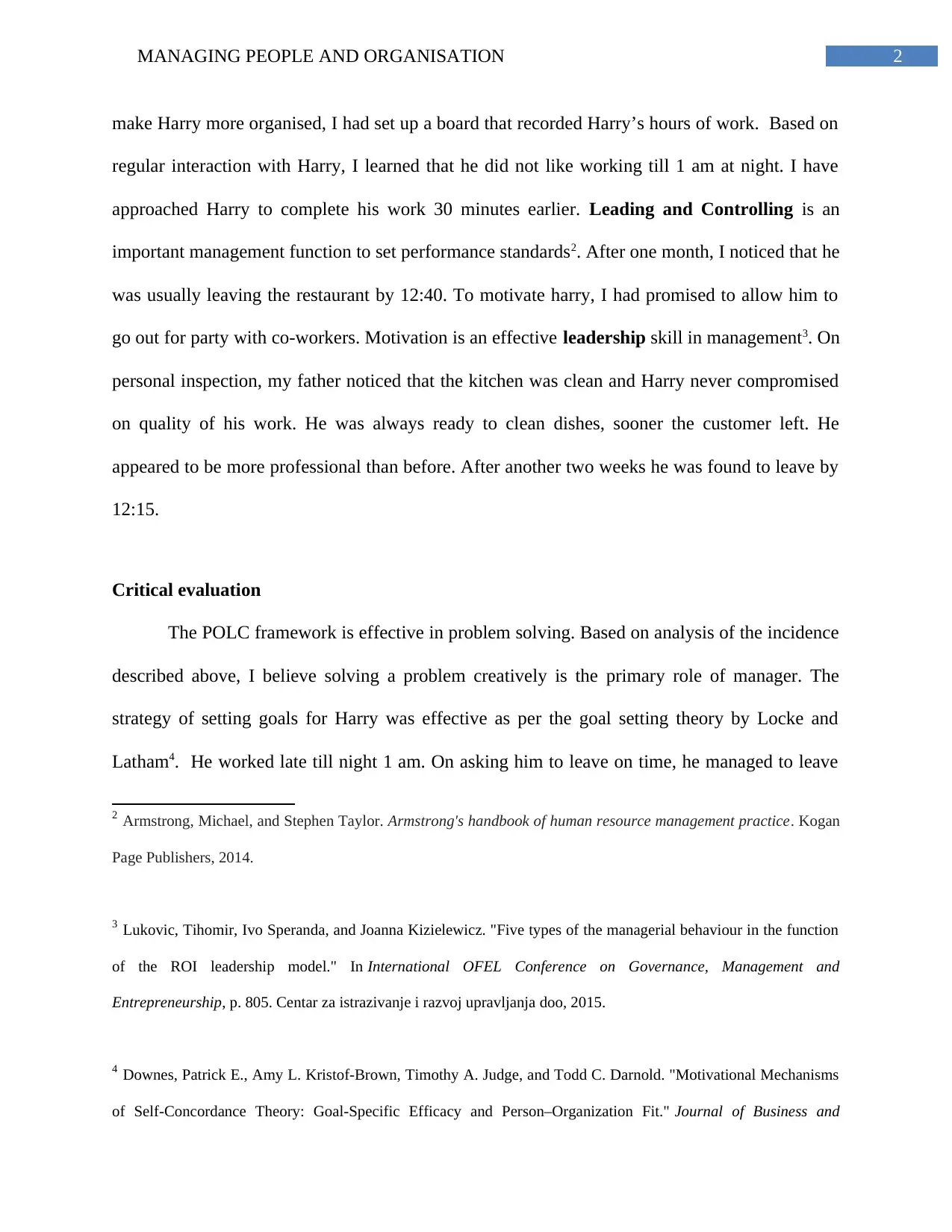
2MANAGING PEOPLE AND ORGANISATION
make Harry more organised, I had set up a board that recorded Harry’s hours of work. Based on
regular interaction with Harry, I learned that he did not like working till 1 am at night. I have
approached Harry to complete his work 30 minutes earlier. Leading and Controlling is an
important management function to set performance standards2. After one month, I noticed that he
was usually leaving the restaurant by 12:40. To motivate harry, I had promised to allow him to
go out for party with co-workers. Motivation is an effective leadership skill in management3. On
personal inspection, my father noticed that the kitchen was clean and Harry never compromised
on quality of his work. He was always ready to clean dishes, sooner the customer left. He
appeared to be more professional than before. After another two weeks he was found to leave by
12:15.
Critical evaluation
The POLC framework is effective in problem solving. Based on analysis of the incidence
described above, I believe solving a problem creatively is the primary role of manager. The
strategy of setting goals for Harry was effective as per the goal setting theory by Locke and
Latham4. He worked late till night 1 am. On asking him to leave on time, he managed to leave
2 Armstrong, Michael, and Stephen Taylor. Armstrong's handbook of human resource management practice. Kogan
Page Publishers, 2014.
3 Lukovic, Tihomir, Ivo Speranda, and Joanna Kizielewicz. "Five types of the managerial behaviour in the function
of the ROI leadership model." In International OFEL Conference on Governance, Management and
Entrepreneurship, p. 805. Centar za istrazivanje i razvoj upravljanja doo, 2015.
4 Downes, Patrick E., Amy L. Kristof-Brown, Timothy A. Judge, and Todd C. Darnold. "Motivational Mechanisms
of Self-Concordance Theory: Goal-Specific Efficacy and Person–Organization Fit." Journal of Business and
make Harry more organised, I had set up a board that recorded Harry’s hours of work. Based on
regular interaction with Harry, I learned that he did not like working till 1 am at night. I have
approached Harry to complete his work 30 minutes earlier. Leading and Controlling is an
important management function to set performance standards2. After one month, I noticed that he
was usually leaving the restaurant by 12:40. To motivate harry, I had promised to allow him to
go out for party with co-workers. Motivation is an effective leadership skill in management3. On
personal inspection, my father noticed that the kitchen was clean and Harry never compromised
on quality of his work. He was always ready to clean dishes, sooner the customer left. He
appeared to be more professional than before. After another two weeks he was found to leave by
12:15.
Critical evaluation
The POLC framework is effective in problem solving. Based on analysis of the incidence
described above, I believe solving a problem creatively is the primary role of manager. The
strategy of setting goals for Harry was effective as per the goal setting theory by Locke and
Latham4. He worked late till night 1 am. On asking him to leave on time, he managed to leave
2 Armstrong, Michael, and Stephen Taylor. Armstrong's handbook of human resource management practice. Kogan
Page Publishers, 2014.
3 Lukovic, Tihomir, Ivo Speranda, and Joanna Kizielewicz. "Five types of the managerial behaviour in the function
of the ROI leadership model." In International OFEL Conference on Governance, Management and
Entrepreneurship, p. 805. Centar za istrazivanje i razvoj upravljanja doo, 2015.
4 Downes, Patrick E., Amy L. Kristof-Brown, Timothy A. Judge, and Todd C. Darnold. "Motivational Mechanisms
of Self-Concordance Theory: Goal-Specific Efficacy and Person–Organization Fit." Journal of Business and
⊘ This is a preview!⊘
Do you want full access?
Subscribe today to unlock all pages.

Trusted by 1+ million students worldwide
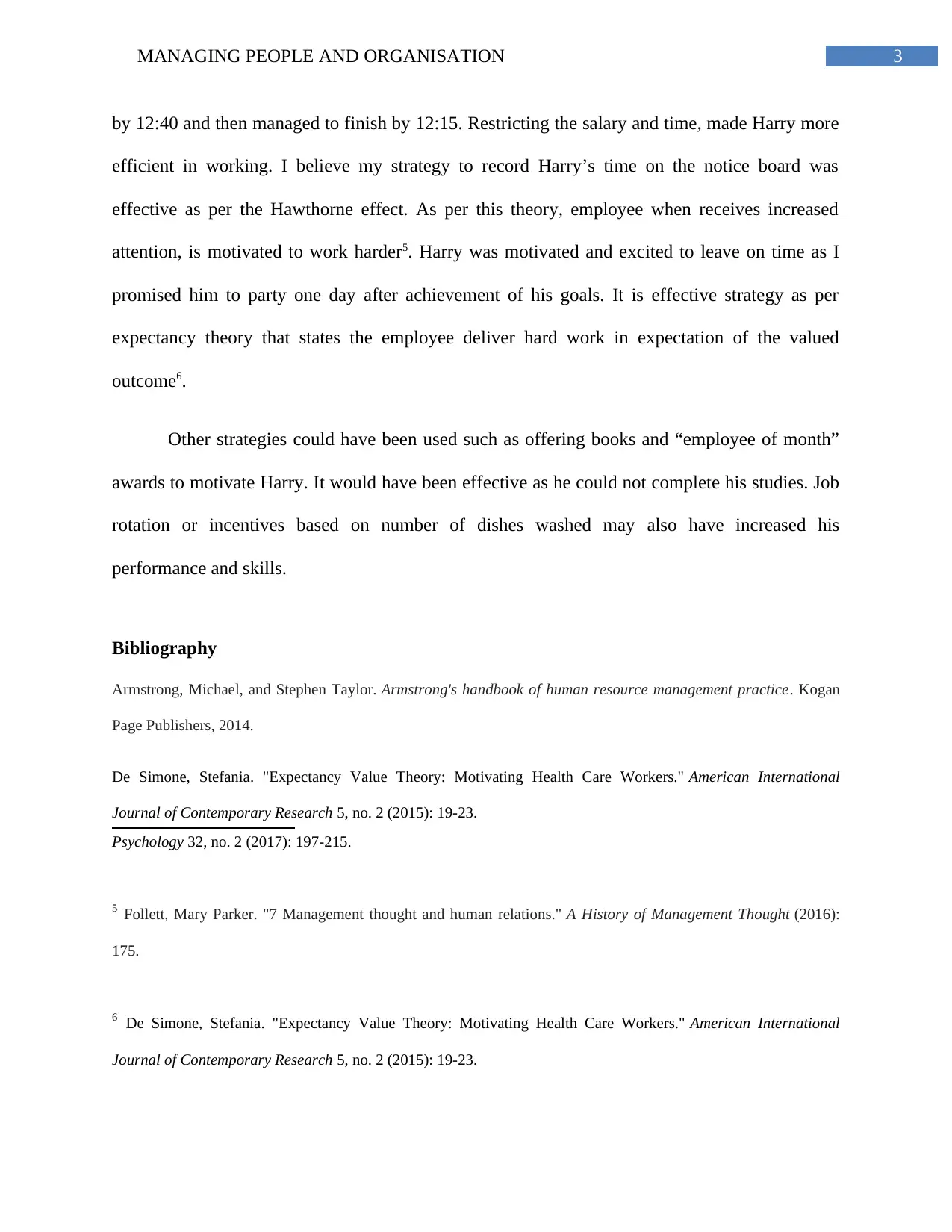
3MANAGING PEOPLE AND ORGANISATION
by 12:40 and then managed to finish by 12:15. Restricting the salary and time, made Harry more
efficient in working. I believe my strategy to record Harry’s time on the notice board was
effective as per the Hawthorne effect. As per this theory, employee when receives increased
attention, is motivated to work harder5. Harry was motivated and excited to leave on time as I
promised him to party one day after achievement of his goals. It is effective strategy as per
expectancy theory that states the employee deliver hard work in expectation of the valued
outcome6.
Other strategies could have been used such as offering books and “employee of month”
awards to motivate Harry. It would have been effective as he could not complete his studies. Job
rotation or incentives based on number of dishes washed may also have increased his
performance and skills.
Bibliography
Armstrong, Michael, and Stephen Taylor. Armstrong's handbook of human resource management practice. Kogan
Page Publishers, 2014.
De Simone, Stefania. "Expectancy Value Theory: Motivating Health Care Workers." American International
Journal of Contemporary Research 5, no. 2 (2015): 19-23.
Psychology 32, no. 2 (2017): 197-215.
5 Follett, Mary Parker. "7 Management thought and human relations." A History of Management Thought (2016):
175.
6 De Simone, Stefania. "Expectancy Value Theory: Motivating Health Care Workers." American International
Journal of Contemporary Research 5, no. 2 (2015): 19-23.
by 12:40 and then managed to finish by 12:15. Restricting the salary and time, made Harry more
efficient in working. I believe my strategy to record Harry’s time on the notice board was
effective as per the Hawthorne effect. As per this theory, employee when receives increased
attention, is motivated to work harder5. Harry was motivated and excited to leave on time as I
promised him to party one day after achievement of his goals. It is effective strategy as per
expectancy theory that states the employee deliver hard work in expectation of the valued
outcome6.
Other strategies could have been used such as offering books and “employee of month”
awards to motivate Harry. It would have been effective as he could not complete his studies. Job
rotation or incentives based on number of dishes washed may also have increased his
performance and skills.
Bibliography
Armstrong, Michael, and Stephen Taylor. Armstrong's handbook of human resource management practice. Kogan
Page Publishers, 2014.
De Simone, Stefania. "Expectancy Value Theory: Motivating Health Care Workers." American International
Journal of Contemporary Research 5, no. 2 (2015): 19-23.
Psychology 32, no. 2 (2017): 197-215.
5 Follett, Mary Parker. "7 Management thought and human relations." A History of Management Thought (2016):
175.
6 De Simone, Stefania. "Expectancy Value Theory: Motivating Health Care Workers." American International
Journal of Contemporary Research 5, no. 2 (2015): 19-23.
Paraphrase This Document
Need a fresh take? Get an instant paraphrase of this document with our AI Paraphraser
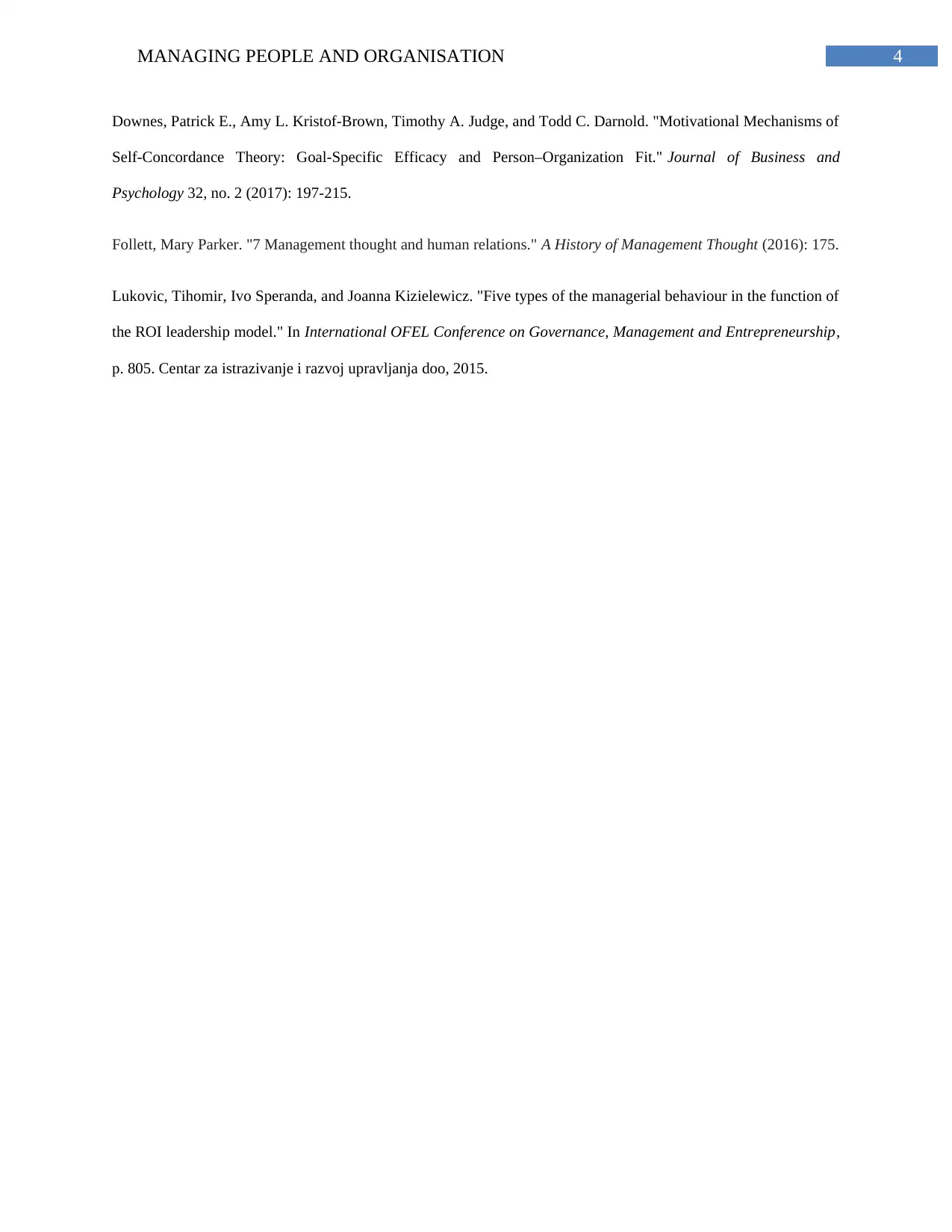
4MANAGING PEOPLE AND ORGANISATION
Downes, Patrick E., Amy L. Kristof-Brown, Timothy A. Judge, and Todd C. Darnold. "Motivational Mechanisms of
Self-Concordance Theory: Goal-Specific Efficacy and Person–Organization Fit." Journal of Business and
Psychology 32, no. 2 (2017): 197-215.
Follett, Mary Parker. "7 Management thought and human relations." A History of Management Thought (2016): 175.
Lukovic, Tihomir, Ivo Speranda, and Joanna Kizielewicz. "Five types of the managerial behaviour in the function of
the ROI leadership model." In International OFEL Conference on Governance, Management and Entrepreneurship,
p. 805. Centar za istrazivanje i razvoj upravljanja doo, 2015.
Downes, Patrick E., Amy L. Kristof-Brown, Timothy A. Judge, and Todd C. Darnold. "Motivational Mechanisms of
Self-Concordance Theory: Goal-Specific Efficacy and Person–Organization Fit." Journal of Business and
Psychology 32, no. 2 (2017): 197-215.
Follett, Mary Parker. "7 Management thought and human relations." A History of Management Thought (2016): 175.
Lukovic, Tihomir, Ivo Speranda, and Joanna Kizielewicz. "Five types of the managerial behaviour in the function of
the ROI leadership model." In International OFEL Conference on Governance, Management and Entrepreneurship,
p. 805. Centar za istrazivanje i razvoj upravljanja doo, 2015.
1 out of 5
Related Documents
Your All-in-One AI-Powered Toolkit for Academic Success.
+13062052269
info@desklib.com
Available 24*7 on WhatsApp / Email
![[object Object]](/_next/static/media/star-bottom.7253800d.svg)
Unlock your academic potential
Copyright © 2020–2025 A2Z Services. All Rights Reserved. Developed and managed by ZUCOL.





